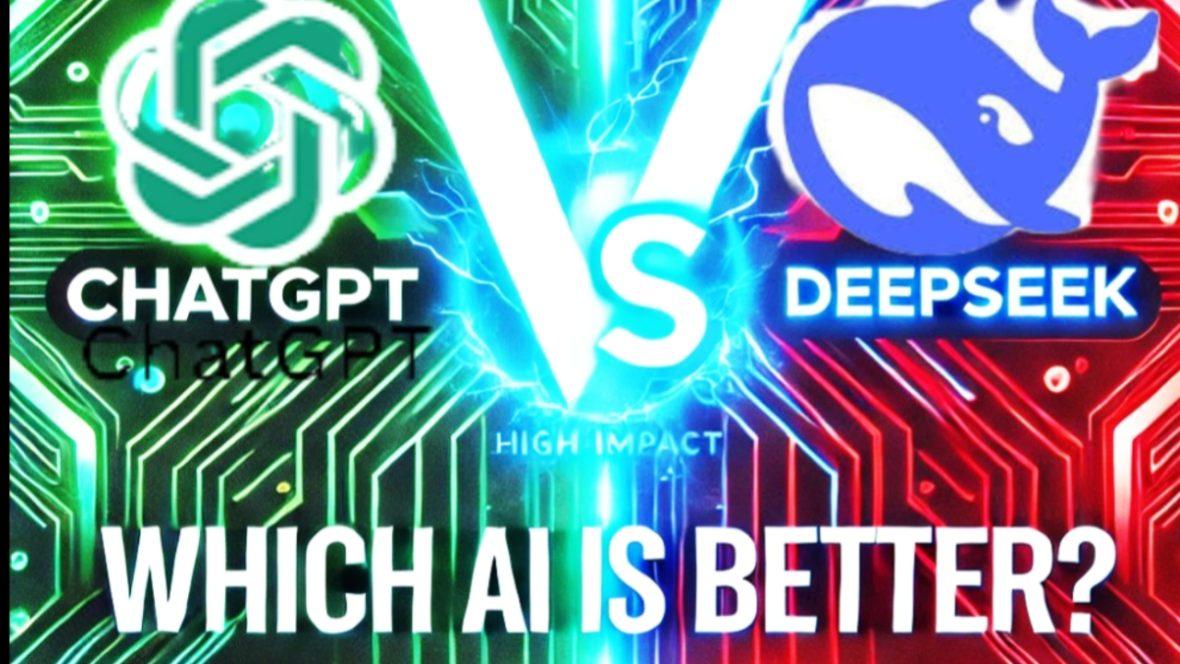ChatGPT vs. DeepSeek: A Comprehensive Comparison of Two AI Giants
Artificial intelligence (AI) chatbots have become essential tools for businesses, developers, and everyday users. Among the top contenders are ChatGPT (developed by OpenAI) and DeepSeek (developed by DeepSeek AI). But how do they compare? Which one suits your needs better?
In this blog, we’ll explore 10 key differences between ChatGPT and DeepSeek, helping you decide which AI chatbot is the right fit for you.
1. Developer & Origin
- ChatGPT: Created by OpenAI, a U.S.-based AI research company known for its advanced language models.
- DeepSeek: Developed by DeepSeek AI, a Chinese company specializing in AI and large language models.
Key Takeaway:
ChatGPT is Western-focused, while DeepSeek is designed for Chinese-speaking users.
2. Language Focus
- ChatGPT: Excels in English, with strong multilingual support. However, it may struggle with deep Chinese linguistic nuances.
- DeepSeek: Optimized for Chinese, making it superior for Mandarin text, cultural references, and local expressions.
Example:
If you ask both AI models to analyze a classical Chinese poem, DeepSeek might provide a more accurate interpretation than ChatGPT.
3. Content Policies & Censorship
- ChatGPT: Moderated under OpenAI’s ethical guidelines, restricting misinformation, political bias, and harmful content.
- DeepSeek: Aligns with China’s regulatory standards, likely imposing stricter content filtering.
Key Difference:
ChatGPT may refuse to discuss sensitive global political topics, while DeepSeek likely follows Chinese government regulations.
4. Strength in Programming & Coding
- ChatGPT: Strong in general-purpose programming, supporting languages like Python, Java, and C++.
- DeepSeek: Specialized in AI-related coding, with DeepSeek Coder offering enhanced code generation.
Example:
If you need AI-generated Python scripts, both are useful. However, DeepSeek might be more optimized for machine learning and algorithmic coding.
5. Accessibility & User Interface
- ChatGPT: Accessible via OpenAI’s website, mobile apps, and APIs, available in most countries.
- DeepSeek: Likely integrated into Chinese platforms (WeChat, Baidu AI, etc.), with limited international access.
Key Difference:
ChatGPT is widely available worldwide (except China, Iran, etc.), whereas DeepSeek is China-centric.
6. Knowledge Updates & Internet Browsing
- ChatGPT: Knowledge is cut off at a certain point, unless browsing tools are enabled.
- DeepSeek: Likely updated with Chinese web data, but update cycles depend on DeepSeek AI’s policies.
Example:
If you ask for the latest tech news, ChatGPT may provide outdated information unless browsing is enabled, while DeepSeek may rely on Chinese search engines like Baidu.
7. Integration with Other AI Tools
- ChatGPT: Works with OpenAI’s ecosystem, including DALL·E (image generation) and various AI models.
- DeepSeek: Likely integrates with Chinese AI tools and enterprise applications.
Example:
If you need an AI to generate images, ChatGPT’s integration with DALL·E makes it a better choice.
8. Bias & Cultural Understanding
- ChatGPT: May have a Western-centric bias in historical, cultural, and political discussions.
- DeepSeek: More aligned with Chinese perspectives, making it more accurate for local cultural discussions.
Example:
If you ask about global history, ChatGPT might provide a more Westernized viewpoint, while DeepSeek will present a China-focused perspective.
9. Availability & Restrictions
- ChatGPT: Banned in China, Russia, and some other regions due to policy restrictions.
- DeepSeek: Likely restricted outside of China, primarily serving Chinese-speaking users.
Key Takeaway:
If you are in China, DeepSeek is more accessible, while ChatGPT is the go-to AI for international users.
10. Open Source vs. Proprietary
- ChatGPT: Closed-source, with API access available but no full model transparency.
- DeepSeek: Some versions (like DeepSeek Coder) are open-source, allowing customization.
Example:
Developers looking for an open-source AI model might prefer DeepSeek’s open-source coding models over ChatGPT’s proprietary system.
Final Verdict: Which One Should You Choose?
Your choice depends on your needs:
✅ Use ChatGPT if:
✔️ You need a globally available AI chatbot.
✔️ You want strong English and multilingual capabilities.
✔️ You require integration with OpenAI tools (DALL·E, API, etc.).
✅ Use DeepSeek if:
✔️ You work primarily in Chinese and need accurate local knowledge.
✔️ You require compliance with China’s regulations.
✔️ You prefer an open-source AI model for coding tasks.
Table Summary: ChatGPT vs. DeepSeek
| Feature | ChatGPT (OpenAI) | DeepSeek (DeepSeek AI) |
|---|---|---|
| Developer | OpenAI (USA) | DeepSeek AI (China) |
| Language Strength | Best for English & global languages | Best for Chinese & regional content |
| Content Censorship | Moderate (OpenAI guidelines) | Stricter (China’s regulations) |
| Programming Skills | General coding & debugging | AI-focused coding (DeepSeek Coder) |
| Availability | Global (except China, Iran, etc.) | Mostly available in China |
| Knowledge Updates | Requires browsing for latest data | Likely updated with Chinese sources |
| Tool Integration | OpenAI’s ecosystem (DALL·E, API) | Chinese AI platforms |
| Cultural Bias | Western-centric | China-focused |
| Open Source? | No (closed-source) | Yes (some models open-source) |
Conclusion
Both ChatGPT and DeepSeek are powerful AI chatbots, but they serve different audiences.
- For English-speaking users and global accessibility → ChatGPT is the best choice.
- For Chinese-speaking users and local compliance → DeepSeek is better suited.
What do you think? Which AI chatbot fits your needs better? Let us know in the comments!




